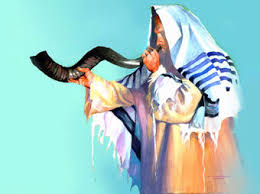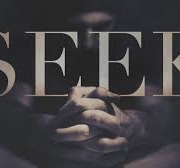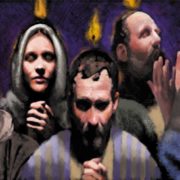Rosh Hashanah, Yom Kippur and Ten Days of Awe – An Introduction
The Purpose of Seeking God Continually: A Deceitful Heart
Jeremiah 17:9 The heart is deceitful above all things, and it is exceedingly perverse and corrupt and severely, mortally sick! Who can know it [perceive, understand, be acquainted with his own heart and mind]?
Since our heart, or soul, is deceitful above all things it most definitely can deceive us into believing that we are believing and trusting in Jesus – when in reality we are really trusting in ourselves. Also it has the potential to deceive us into believing that we are worshipping, serving, and obeying Jesus – when in reality we are simply serving ourselves. For this reason we seek God.
John Piper, in an article entitled, Seeking God states: Seeking the Lord means seeking his presence. “Presence” is a common translation of the Hebrew word “face.” Literally, we are to seek his “face.” But this is the Hebraic way of having access to God. To be before his face is to be in his presence.
But aren’t his children always in his presence? Yes and no. Yes in two senses: First, in the sense that God is omnipresent and therefore always near everything and everyone. He holds everything in being. His power is ever-present in sustaining and governing all things.
And second, yes, he is always present with his children in the sense of his covenant commitment to always stand by us and work for us and turn everything for our good. “Behold, I am with you always, to the end of the age” (Matthew 28:20). But there is a sense in which God’s presence is not with us always. For this reason, the Bible repeatedly calls us to “seek the Lord . . . seek his presence continually” (Psalm 105:4). God’s manifest, conscious, trusted presence is not our constant experience. There are seasons when we become neglectful of God and give him no thought and do not put trust in him and we find him “unmanifested” — that is, unperceived as great and beautiful and valuable by the eyes of our hearts. His face — the brightness of his personal character — is hidden behind the curtain of our carnal desires. This condition is always ready to overtake us. That is why we are told to “seek his presence continually.”
Examples abound in Scripture of characters throughout the Bible who, though well intentioned, were missing God through their daily religious activities. Even the followers of Jesus had a tendency to wander away from pursuing Him rightly. At the beginning of the Book of Revelation John is described as worshipping the Lord in the Spirit, yet his focus is redirected as Jesus surprises him from behind. Mary Magdalene is startled when she hears her Savior’s Voice coming not from the empty tomb but from the garden behind her. Two of Jesus’ followers, walking on the road to Emmaus, find themselves consumed by the death of Jesus. That is until they are surprised from behind by the Voice which warms their hearts to the fact that He has Risen, His body broken for them. Throughout the Bible we are encouraged and called to seek the Lord to find Him. It’s interesting to note that the Spirit is compared to a river. If you seek to follow a river from its banks you will note it’s twists and turns, its rises and falls. At times you may even lose sight of the river because of the thick brush, or rising hills or mountains. The problem of seeing is remedied as the seeker moves from an observer to a participant. That initial jump lands them in experiencing the waters up close and personal as the waters carry carry them wherever it wishes.
Rosh Hashanah and Yom Kippur
Like the river the experience of seeking God though these feasts and festivals requires some introduction to understand the two holy days that are utilized for seeking. The first feast, Rosh Hashanah, literally means the “head of the year”, being the Jewish New Year. The biblical name for this holiday is Yom Teruah, literally means “day of shouting or blasting”. It is the first of the Jewish High Holy Days specified by Leviticus 23:23–32. The two days of Rosh Hashanah (September 29 at sundown to sundown September 30) usher in the Ten Days of Repentance (Aseret Yemei Teshuvah), also known as the Days of Awe (Yamim Noraim), which culminate in the major fast day of Yom Kippur, the Day of Atonement. The Days of Awe represent the climax of a longer process. Starting at the beginning of the previous month, called Elul, the shofar is traditionally sounded at the conclusion of the morning service. A ram’s horn that makes a trumpet-like sound, the shofar is intended as a wake-up call to prepare for the Tishrei holidays. One week before Rosh Hashanah, special petitionary prayers called Selichot are added to the ritual. Rosh Hashanah itself is also known as Yom Hadin or the Day of Judgment, on which God opens the Books of Life and Death, which are then sealed on Yom Kippur.
Rosh hashanah is accompanied by Yom Kippur which is “the tenth day of [the] seventh month”[3] (Tishrei) and is regarded as the “Sabbath of Sabbaths”. According to Jewish tradition, God inscribes each person’s fate for the coming year into a book, the Book of Life, on Rosh Hashanah, and waits until Yom Kippur to “seal” the verdict. During the Days of Awe, a Jew tries to amend their behavior and seek forgiveness for wrongs done against God (bein adam leMakom) and against other human beings (bein adam lechavero). The evening and day of Yom Kippur are set aside for public and private petitions and confessions of guilt (Vidui). At the end of Yom Kippur, one hopes that they have been forgiven by God. The Yom Kippur prayer service includes several unique aspects. One is the actual number of prayer services. Unlike a regular day, which has three prayer services (Ma’ariv, the evening prayer; Shacharit, the morning prayer; and Mincha, the afternoon prayer), or a Shabbat or Yom Tov, which have four prayer services (Ma’ariv; Shacharit; Mussaf, the additional prayer; and Mincha), Yom Kippur has five prayer services (Ma’ariv; Shacharit; Musaf; Mincha; and Ne’ilah, the closing prayer). The prayer services also include private and public confessions of sins (Vidui) and a unique prayer dedicated to the special Yom Kippur avodah (service) of the Kohen Gadol (high priest) in the Holy Temple in Jerusalem.
Obstacles To Avoid
Choosing to jump into the river will introduce you quickly to the immediate need of navigation. For in the river you will be introduced to obstacles like buolders, fallen trees, and debris that will seek to snag, impede, or completely halt your progress. With that analogy in mind there are several obstacles to be aware as you navigate the waters of seeking God. For example when the two disciples on the Emmaus Road reached their destination it appeared as if Jesus would not continue with them. It wasn’t until they urged Him to remain that they experienced the realization of Who this stranger really was. The same principle occurs between Moses and God at the burning bush. Scripture records: And Moses said, I will now turn aside and see this great sight, why the bush is not burned. And when the Lord saw that he turned aside to see, God called to him …out of the midst of the bush and said, Moses, Moses! And he said, Here am I. Exodus 3:3-4
Another profound Biblical example of this principle of turning aside to pursue, seek, and see God is found in the narrative of Elijahs’ prophetic mantle being handed down to Elisha. Scripture records:
When the Lord was about to take Elijah up to heaven by a whirlwind, Elijah and Elisha were going from Gilgal. And Elijah said to Elisha, Tarry here, I pray you, for the Lord has sent me to Bethel. But Elisha replied, As the Lord lives and as your soul lives, I will not leave you. So they went down to Bethel. The prophets’ sons who were at Bethel came to Elisha and said, Do you know that the Lord will take your master away from you today? He said, Yes, I know it; hold your peace. Elijah said to him, Elisha, tarry here, I pray you, for the Lord has sent me to Jericho. But he said, As the Lord lives and as your soul lives, I will not leave you. So they came to Jericho. The sons of the prophets who were at Jericho came to Elisha and said, Do you know that the Lord will take your master away from you today? And he answered, Yes, I know it; hold your peace. Elijah said to him, Tarry here, I pray you, for the Lord has sent me to the Jordan. But he said, As the Lord lives and as your soul lives, I will not leave you. And the two of them went on. Fifty men of the sons of the prophets also went and stood [to watch] afar off; and the two of them stood by the Jordan. And Elijah took his mantle and rolled it up and struck the waters, and they divided this way and that, so that the two of them went over on dry ground. And when they had gone over, Elijah said to Elisha, Ask what I shall do for you before I am taken from you. And Elisha said, I pray you, let a double portion of your spirit be upon me. He said, You have asked a hard thing. However, if you see me when I am taken from you, it shall be so for you—but if not, it shall not be so. As they still went on and talked, behold, a chariot of fire and horses of fire parted the two of them, and Elijah went up by a whirlwind into heaven. And Elisha saw it and he cried, My father, my father! The chariot of Israel and its horsemen! And he saw him no more. And he took hold of his own clothes and tore them in two pieces. He took up also the mantle of Elijah that fell from him and went back and stood by the bank of the Jordan.
And he took the mantle that fell from Elijah and struck the waters and said, Where is the Lord, the God of Elijah? And when he had struck the waters, they parted this way and that, and Elisha went over. 2 Kings 2:1-14
Three times Elijah tests Elisha to see if he would turn back and three times Elisha passed the test. But did you notice the final exam? Elijah had told Elisha if he could keep his eyes on Elijah and not be distracted by any other thing he would receive a double portion of the Spirit that rested upon Elijah. Elisha’s final test involved the flaming chariot of angels. Had Elisha fixed his gaze on this fiery wonder he would have missed the greater prize. Beholding the sight would have been a good thing, but not the best.
The Rock of Offense, Jesus, is that test for us. Throughout my ministry I have observed with sadness those who have flunked this test missing God’s best. It is my opinion that Jesus’ “hobby” during His earthly ministry was to offend minds in order to expose hearts. This ‘hobby” of Jesus has continued into the present. Because many in the church are controlled by their souls they will most often choose that which is sensible, logical, comfortable or reasonable. Yet a life in the Spirit, of truly knowing Jesus, is not accomplished through living according to what is comfortable, reasonable, or appealing to the soul. It is quite the opposite. Regarding these obstacles John Piper offers some final words of wisdom:
And there are endless obstacles that we must get around in order to see him clearly, and so that we can be in the light of his presence. We must flee spiritually dulling activities. We must run from them and get around them. They are blocking our way. We know what makes us vitally sensitive to God’s appearances in the world and in the word. And we know what dulls us and blinds us and makes us not even want to seek him. These things we must move away from and go around if we would see God. That is what seeking God involves. And as we direct our minds and hearts Godward in all our experiences, we cry out to him. This too is what seeking him means. Seek the Lord while he may be found; call upon him while he is near. (Isaiah 55:6) If you will seek God and plead with the Almighty for mercy . . . (Job 8:5) Seeking involves calling and pleading. “O Lord, open my eyes. O Lord, pull back the curtain of my own blindness. Lord, have mercy and reveal yourself. I long to see your face.”
Thuswe are ultimatelyresponding to the call of the Lord to seek Him and not simply observe a Jewish feast. I’ve taken the liberties of seeking to be creative in our approach of pursuing the Lord, and was reminded of the “3 for $10” Special at Chili’s Restaurant. In this pursuit I want to provide you with a “menu” of options to choose from that will assist you in breaking through to His Presence.
3 for 10 “Hot and Spicy” Yom Kippur Fasting Special
(What Price Are You Willing to Pay?)
Start with a drink of the Holy Spirit, then choose an appetizer and an entree from our “3 For 10” Fasting Menu. Entrees include Fasting, Praying, Repenting, Worshipping, and time with the “Word” in the word & more. Appetizers include selected Humility, Holiness, Obedience and Setting the Mind and Heart to focus our attention on Jesus. So many choices – all for 10 days!
Choose Your Main Entrees
Choose your Fast:
- food – Full Fast, Daniel Fast, or Partial Fast.
- sleep – keep a night watch of worship and prayer. The Jews had 3: Sundown to 10 PM; 10 PM to 2 AM; and 2 AM to Sunrise.
- time – have focused prayer morning, noon, and night; one of these, two of these or all of these.
- media – have a time to turn off all media devices using that time to seek God.
Choose your Repentance:
- take the soul and spirit man evaluation – take the evaluation, score and evaluate yourself to see if you are more soulish than spiritual.
- pray – through the soul and spirit man evaluation regarding where you need to change.
- confess your sins specifically – note the areas in the evaluation where you have been living more for your soulish desires than for the Lord. Then confess those sins to the Lord.
- repent – this is a plan of action in response to the areas you have sinned. What actions are you going to take to overcome your soul?
Choose Your Worship:
- Sing songs of worship to the Lord at the beginning of the day. (A Great Resource for this is the internet, especially youtube. Simply google the name of the song and push play).
- Thanksgiving practiced at the beginning of the day and throughout the day, especially for unmet needs, and in spite of frustrating or anxious situations. Practice this rigorously for the good and in spite of the bad.
- Use the Psalms to praise and worship Him.
- Read Romans 12:1-2 For Paul’s definition of worship asking yourself if you are offering to the Lord true worship, or simply singing a song?
NOTE: Not all Christian music is worship. Some songs are testimonials focusing on what Jesus has done, while other songs are prayers. A true worship song is personal and directed towards the Lord.
Choose Your Word
- daily quiet or devotional time – this begins at the first part of the day before you start your regular activities.
- meditating in the word – have a specific book of the Bible that you are meditating on reading slowly, one verse or paragraph at a time, inviting the Spirit to lead and teach you. (Blue Letter Online Study Bible is a great resource for this).









